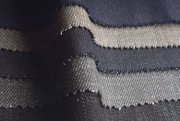Strategic Move
Everybody wants a piece of the lucrative L.A. premium-jeans market, and that includes $100-million fabric supplier Italdenim. Founded in 1973, the company opened its first U.S. office in October 2006 in Marina Del Rey, Calif., and is slowly building a roster of American clients.Headquartered in Arconate, Italy, in the province of Milan, Italdenim’s European clients include G-Star, Diesel, Replay, Miss Sixty, and Nolita.The California Apparel News spoke with Fabio La Iacona, Italdenim’s U.S. sales manager, about the company’s strategic move to enter the Los Angeles market.
CAN: Why did Italdenim feel it was a strategic move to open an office in Los Angeles? FLI: Compared to our competitors, we’ve entered the U.S. market very late. That’s because we didn’t have the production capacity, but around three years ago we doubled it. The owners invested a lot into the company, having faith in the market now. But over the last few years there has been much more competition, such as a lot of new suppliers from China. So we decided to focus on the U.S. market, and we think that opening an office here is better than just having an agent, since we can service the customer better.CAN: Italdenim has been in business since 1973. What’s different about the denim market over the past five years? FLI: Denim was born in the U.S., and in the ’70s and ’80s, America was the center of denim production. When Europeans entered the market, they brought more of a sense of fashion, so the fabrics were better.But over the past five to seven years, California has created a new concept of very fashionable denim. Nowadays, the best denim comes from California, with brands like Seven For All Mankind, Citizens of Humanity, Joe’s Jeans. California is the center of the industry, and there’s no longer any gap between Europe and the U.S. Except with a certain aspect of the stretch market, I think the U.S. is far ahead.CAN: And this ultra-premium aspect is really something new, isn’t it?
FLI: Yes, if you look at the prices of higher-end collections, you’d think there was no future for this kind of product, but actually we see an increasing demand that’s just astonishing. Every year the size of the higher-end market is increasing. I can’t forecast how long it will continue, but the majority of the market will come from the higher end. CAN: How have you been greeted as the new guy in town in the world capital of denim?
FLI: Many brands didn’t know us, so in the beginning it was a little difficult. When I’d ask them for an appointment, they didn’t know us, so they said no. It was not easy to get appointments with brands like Seven.First I sent a letter to all the brands introducing our company and explaining our new strategy for the U.S. Then, because everybody here knows each other, they came to appreciate our product because we’re more price-oriented than our competitors.That’s a key factor for us. Our quality is the best on the market, but it’s not easy to start business with brands. Ninety-percent of fabric orders are carry-overs.CAN: What is the price range?
FLI: For 100-percent cotton, the range is $4.70 to $5.50 per yard. They come with a very technical finish. The price for stretch fabric is from $5.50 to $7.CAN: And how are you able to keep the prices low?
FLI: It’s not a matter of margins. It’s a strategic company policy. Since we are new in the market, we want to offer some incentive for new customers.CAN: How long will the prices stay there?
FLI: I can say over the past year we’ve been able to keep prices very low. But for our new collection, Fall/Winter 2008, we had to raise prices a little because the dollar is so weak compared to the euro.CAN: Who was your first new client in Los Angeles?
FLI: My first client was Stitch’s Jeans, who mentioned they were very struck by the collection. Then I got Juicy Couture, St. John Knits, Theory, Ever, and Ernest Sewn.
CAN: Were you able to get any of the big brands you mentioned, like Seven For All Mankind and Citizens for Humanity?
FLI: So far we have not been able to get those big brands, but we have very good business with Joe’s Jeans. This year we should be their top supplier.CAN: What are your new looks for Fall/Winter 2008?
FLI: First of all, colored denim—gray, brown, and green especially. The second trend is un-dyed fabrics. We just saw a Diesel fashion show for Spring/ Summer 2008, and almost half the jeans were un-dyed. Finally, there will be an indigo or black fabric with a colored over-dye in the final stage.There will also be an organic cotton trend. We just got organic certification for the entire production cycle, so we can offer 100-percent organic fabric.CAN: How are you finding life in California?
FLI: I like it.CAN: What about the fashion here? Do you send reports back to the office?
FLI: I’m impressed with the style of California, and I tell my colleagues in Italy about it. With denim, I see a totally different look than in Europe. I see all these ladies with very skinny jeans, a very clean look, and a very light wash. In Europe, we still see heavier washes and less-skinny styles.CAN: Would you say the L.A. look is more forward, or is it simply a matter of regional tastes?
FLI: In the beginning it was a matter of taste, but now it’s becoming a trend. Brands like Seven and Citizens are doing very well now in Europe. They start their products here, and what was once considered a foreign look in Europe is now becoming trendy. So for certain aspects, L.A. designers are ahead.






















